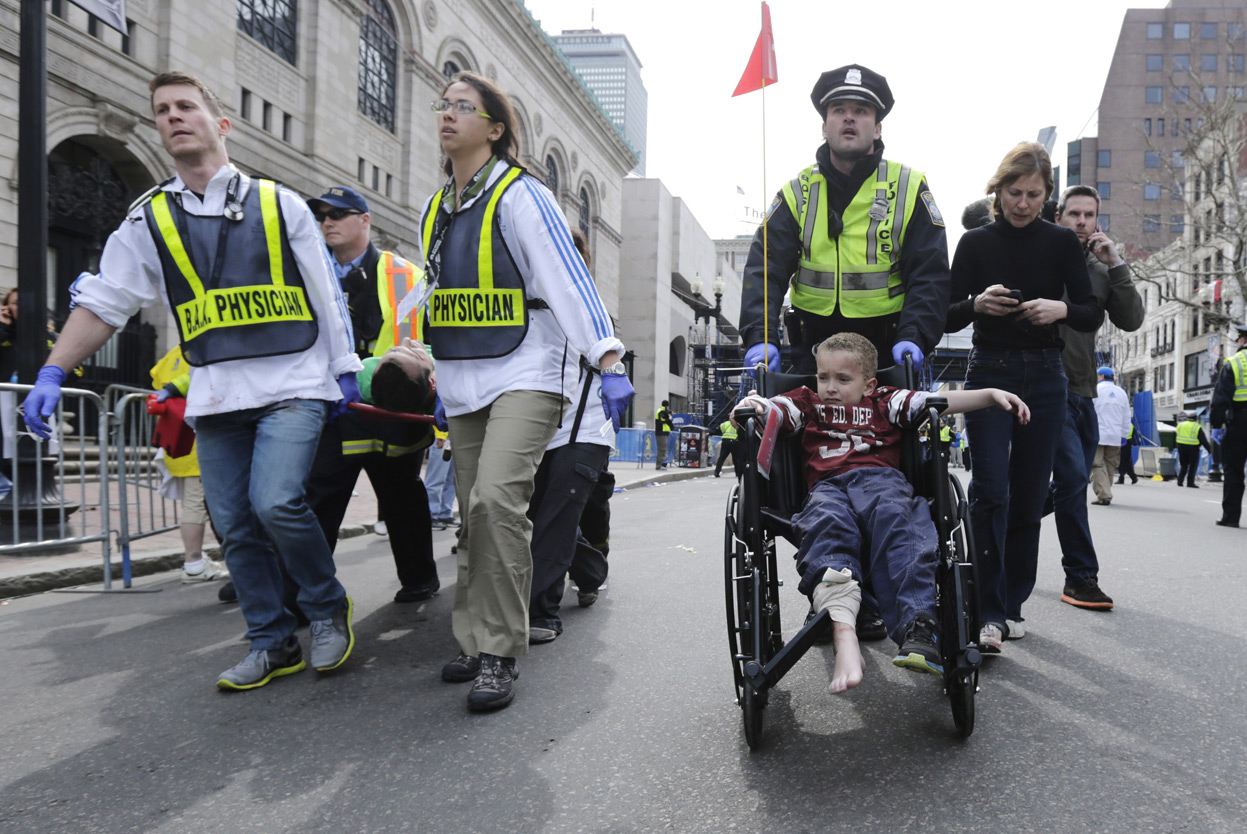“Within minutes, cell phone systems became overloaded and making phone calls and text messages was difficult. Amateur Radio operators performed communication duties under duress and performed admirably. No Amateur Radio volunteers were injured on the course in this terrible act,” said Steve Schwarm, W3EVE, who is the Amateur Radio Course Communication Coordinator and associated with a consortium of clubs and groups known as Marathon Amateur Radio Communications (MARC).
“At the finish line net control, which was only 400 feet from the initial blast, we heard the explosion. I poked my head outside to confirm what I thought it was and saw the white smoke. We immediately knew what had happened and commenced a roll call of all ham operators and medical tents. State Police authorities initially ordered us to lock down and post a ham for security watch outside the net control trailer. Thankfully none of our people were hurt,” said Paul Topolski, W1SEX, Amateur Radio Finish Line Coordinator.
Following the explosion and roll call, Topolski stated that they began pulling together updates and sent the information via the Massachusetts Emergency Management Agency (MEMA) Web-EOC software tool and provided updates via Amateur Radio. Shortly after sending a few updates both Boston Police and Massachusetts State Police gave the order for the tent area to be evacuated. “In my mind, the course end of things is where a lot of work needed to happen as runners eventually needed to be stopped, congregated and transported to safety and staging areas,” Topolski said. “At the finish line, our job was to check on the safety of our people, provide those initial updates and evacuate per police instructions. Three of our Amateur Radio operators redeployed to the Boston Marathon Course Net Control Center.”
Across the course outside of the finish line after the bombings occurred, first aid stations were consolidated to larger first aid stations to pool runners for pickup and to keep runners warm as there were enhanced tents along the route where runners could be kept warm and hydrated. At the Heartbreak Hill first aid station, amateur operators had a complete base station setup, including a computer, and were prepared to handle health and welfare traffic as required. Several shelters were set up along the route at churches and schools, and Amateur Radio operators from secured first aid stations went to those shelters, providing communications in those areas until runners were moved out of their locations.
“My role at the request of Steve, W3EVE, as event organizer before the race was to shadow the course medical tent coordinator for the Red Cross, Kandi Finch,” said Rob Macedo, KD1CY, who is also the Eastern Massachusetts ARES Section Emergency Coordinator. “It was a challenging position but all organizers on both the Amateur Radio side and Red Cross side said things went well in coordinating during normal race conditions and particularly after the bombings.”
At course net control, which was away from the bombings, ham operators controlled their nets calmly and professionally while also expressing an appropriate level of urgency. Over a dozen amateurs at the net control center pooled together to announce messages and keep status of changes along the course route as required.
“Despite the total lack of warning in this situation, amateurs followed a creed I’ve long since preached since the 9/11 terrorist attacks and the mutual aid response to those attacks: ‘blessed are the flexible for they will not get bent out of shape,’” said Steve Schwarm, W3EVE. “Amateurs on the course did what they had to do to assure their own safety and runner safety working with the Red Cross medical people. They did an outstanding job and I was told so by Red Cross organizers as well.”
From an ARES perspective, a heightened state of awareness on the Boston Marathon event is typical, but within 15 minutes of the bombings, Eastern Massachusetts ARES Assistant Section Emergency Coordinator, Carl Aveni, N1FY, issued an ARES Stand-By and requested that amateurs give availability for the next 24 hours. Within minutes, 20 amateurs offered their availability.
“In terms of having amateurs within ARES who cannot get directly involved in the marathon, we have a process where we have them monitor in case of a situation like what occurred on Monday. That process paid off and facilitated a rapid response to our request for possible additional support,” said Aveni.
“Additional details and more input to this story are unfolding and will be updated as that information is pulled together,” Macedo said.
--Thanks to Paul Topolski, W1SEX; Steve Schwarm, W3EVE, and Rob Macedo, KD1CY, for the information.


